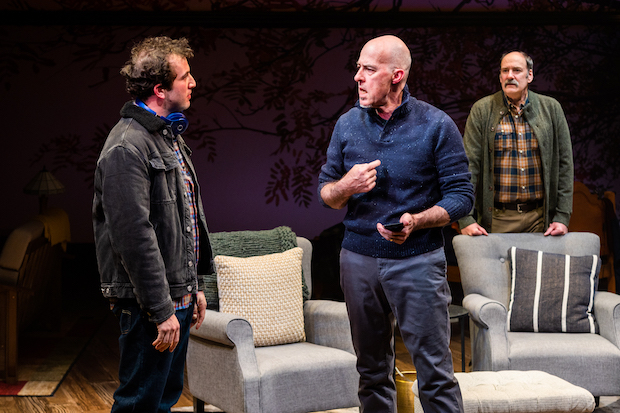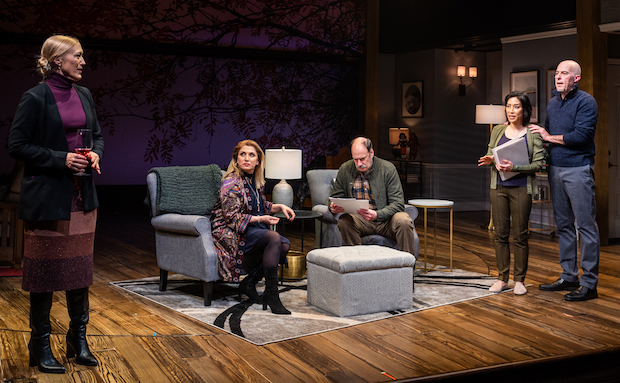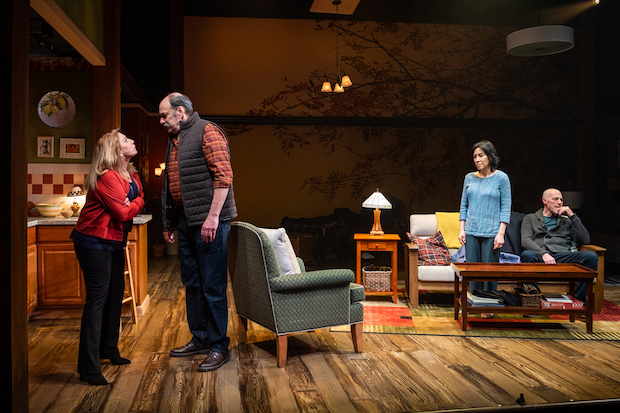Review: Our Brother's Son Is Sophie's Choice Made Easy

(© Russ Rowland)
Would you give up a kidney if your sibling really needed one? What about your child's kidney? And what if that sibling had spent his life undermining you? Does he still deserve one of your vital organs, when you have two? These are the questions Dr. Charles Gluck poses to the audience with his medical melodrama Our Brother's Son, now making its New York debut at the Pershing Square Signature Center. If you're like me, you won't ponder them for long.
The playwright introduces us to an American family, unhappy in fairly typical ways (or so it seems): Oldest brother Leo (Allen McCullough) runs the family business (a textile factory) with his younger brother David (Dan Sharkey), a recovering depressive who earns about a third of what Leo does. Their sister Gail (Leeanne Hutchison) has wisely opted to work elsewhere, but she still knows where the bodies are buried — complicity being a central feature of omertà.
And like a mafia don, Leo buys loyalty with patronage: He footed the tuition bill for Bradley (Harrison Chad), son of David and his salty wife, Mindy (Liz Larsen). But it's been 18 months since graduation and Bradley has rarely left the computer screen in his basement lair. So when it is revealed that Leo is suffering from advanced kidney failure and will require a transplant, he and his wife, Susan (Midori Nakamura), naturally look to Bradley, who doesn't seem to be doing much with his.

(© Russ Rowland)
Dr. Gluck indirectly raises ethical questions surrounding the relationship between capital and unprecedented longevity, a theme that has been too rarely considered in the theater (most notably in Lucy Kirkwood's The Children). Personally, I'm waiting for someone to dramatize this Paul Krugman column that imagines America as a society ruled over by centenarian billionaires.
Leo is obviously a loathsome figure: We know this from his first scene, in which he berates David for not sharing his keen business sense. McCullough plays him with an arctic freeze that goes beyond the emotional decay one can expect from an American man of a certain generation. Even his moments of pathos feel calculated and reptilian. Taken with McCullough's naturally angular features, Leo comes off like Nosferatu in a cardigan. Sure, it's a matter of life and death, but it's hard to care when the character in question is already undead.
The playwright compensates for this lack of stakes with much screaming in the kitchen over shocking reveals that will make you gasp or guffaw, depending on your taste for these things. It was a mixed bag for me: While I saw Dr. Gluck setting up his dominoes from a mile away, it was still fun to watch the spectacular destruction that transpires when he knocks them all down.

(© Russ Rowland)
Much of this has to do with solid performances from the cast, especially Larsen, who gets all the harshest lines and slathers them with extra vinegar. David, played by Sharkey as the ultimate sad sack, never stands a chance. Nakamura brings a needling insistence to Susan that feels right for the role. As the sibling who resists, Hutchison embodies a painful fortitude. And Chad easily steps into the role of the hapless late millennial just waking up to the avarice of the older, richer people around him.
Director David Alpert partially succeeds in delivering a tight staging of a play that might work better as a movie with a rapid succession of short scenes. Adam Koch attempts to make the transitions speedy with a rotating set. He and lighting designer Alan C. Edwards seems to have gone hog wild at Lamps Plus with an array of floor, table, and hanging fixtures, the logic of which has remained on the design meeting table. A bed, two gray armchairs, and a sofa endlessly spin around the stage, looking like a West Elm showroom jazzed up with a giant lazy Susan. And it's still not enough to facilitate every space Dr. Gluck's script calls for: By the end, black-clad stage ninjas place and strike more chairs during blackouts (underscored by Nathan Leigh's urgent original compositions). The image of autumn leaves falling off tree branches acts as a giant metaphor painted on the upstage wall — a touch as subtle as anything else in this play.
As you might have guessed, Our Brother's Son is a vanity project by a retired gastroenterologist (the name above the title, "Family Pool Productions," suggests the sacrifices made to bring this play to the off-Broadway stage). Dr. Gluck is certainly better qualified than I am to comment on the ethics of organ transplants from the young to the old. And perhaps as someone who has spent a career witnessing hard choices, he wanted to let his audience off easy. As a new dramatist, however, it's tantamount to malpractice.











